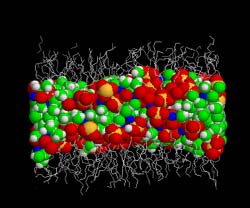Articles and reports from the Life Sciences and chemistry area deal with applied and basic research into modern biology, chemistry and human medicine.
Valuable information can be found on a range of life sciences fields including bacteriology, biochemistry, bionics, bioinformatics, biophysics, biotechnology, genetics, geobotany, human biology, marine biology, microbiology, molecular biology, cellular biology, zoology, bioinorganic chemistry, microchemistry and environmental chemistry.

’Hyperactive’ antifreeze protein has eluded researchers for more than 30 years
A surprising discovery by Queen’s researchers helps explain why fish swimming in icy sea water don’t freeze.
The team, led by Biochemistry Professor Peter Davies, has identified a new “antifreeze” protein found in the blood of winter flounder enabling the fish to withstand temperatures as low as -1.9 degrees Celsius: the freezing point of sea water. The antifreeze plasma protei

Such research could offer important evolutionary insights into the nature of intelligence in primates
Until now, primatologists believed lemurs to be primitive, ancient offshoots of the primate family tree, with far less intelligence than their more sophisticated cousins, monkeys, apes and humans. But at the Duke University Primate Center, with the gentle touch of his nose to a computer screen, the ringtail lemur called Aristides is teaching psychologist Elizabeth Brannon a startling

Animals often house substantial microbial populations within their bodies. While in some cases the microorganisms are necessary for host survival or reproduction, in the preponderance of cases they are not. It is of great interest to understand whether facultative associations with microorganisms ever benefit the host in lesser ways. Previously, a facultative symbiont was identified in pea aphid which was associated with host plant specialization – there was a dramatic increase in fecundity on clover

At a microscopic level, water molecules behave rather like the needle of a compass. Just as the needle moves when surrounded by a magnetic field (such as that of the Earth), water molecules move slightly in one direction when there is an electric field. Or at least that is what physicists thought till now. Research at the Universitat Autònoma de Barcelona has shown that, in water trapped in the bubbles of a detergent, it is not quite like that: water molecules have a surprising ability to organize th

A team of investigators at The Scripps Research Institute and its Skaggs Institute for Chemical Biology in La Jolla, California has modified a form of the bacterium Escherichia coli to use a 22-amino acid genetic code.
“We have demonstrated the simultaneous incorporation of two unnatural amino acids into the same polypeptide,” says Professor Peter G. Schultz, Ph.D., who holds the Scripps Family Chair in Chemistry at Scripps Research. “Now that we know the genetic code is amenable to expans

Scientists discover a whole new dimension to platelets
Until recently, the story on platelets was pretty simple: tiny blood cells, with limited sophistication because they had no nucleus, and their claim to fame was to be a first-responder to a wound site, to promote healthy clotting and prevent infection. Later scientists theorized platelets might be connected to harmful chronic inflammation, but the links were unclear.
In a paper published in the prestigious scientific jou